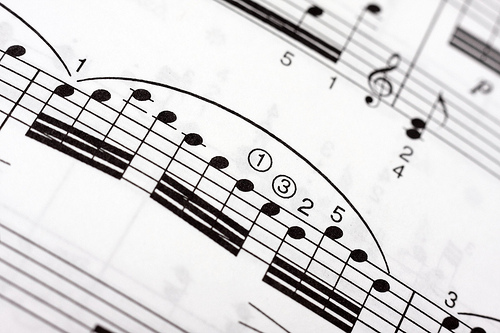You’ve all heard the famous stories about the musicians who don’t know the first thing about the technical theoretical side of music, and have made a living just by being able to write great lyrics and put a tune together on a guitar.

While that works for some, others prefer to learn music theory to ensure they are fully confident in what they’re doing. Having a sound knowledge of music theory can also be more useful if you have an interest in a particular genre, or are interested in the dynamics of a classical orchestra, for example. Music theorists also aren’t always instrument players; they might just want to move into production or another area of the industry.
What is Music Theory?
The easiest way to look at music theory is that it’s the equivalent of grammar in writing. It provides a foundation and a basis for creating robust, technically correct pieces of work, while for instrument players it allows them to understand music when it is written and play the sounds in the manner intended.
What do You Already Know?
What you already know or can do with an instrument can make learning music theory easy or difficult, depending on a number of variables. If you’re starting from scratch, then you should look for the most simplified resources available, whether that’s a book or an online platform, and ensure it is pitched at a level you can understand and relate to.
Take the time to do this; simply going straight for something like a ‘Dummies’ series might sound sensible, but it might just be telling you what you already know.
Master One Thing at a Time
Music theory is a huge spectrum of ideas and principles, and is going to take a long time to learn and master. With that in mind, fashioning an approach to learning music theory can be difficult.
The best approach to take is to learn one thing at a time, and then put it into practice, ensuring you’re great at it before moving onto the next step. The trick is to start building each new element of music theory into what you’re doing, so it’s a progressive journey where you’re continually adding new ideas and learning to your repertoire.
Finding a Focus
If you’re passionate about a particular niche, like rock music, for example, then ensure you focus on the areas that are most relevant to that. Learning about pentatonic scale will be more useful than maintaining rhythm or a consistent beat, for example, while harmonies might not be something you’re too bothered about, either.
Learning Music Theory
Learning music theory is a difficult thing to do, but you can make it as simple as possible my having a plan and focussing on the areas most relevant to you. Remember that practice makes perfect, and you’ll find learning music theory easier than you imagined possible.
Image Source: Horia Varlan
Are you a guitarist? Check out our full range of online guitar lessonsAre you a saxophonist? Check out our full range of online saxophone lessons
Subscribe to Pro Music Tutor from as little as £7.99 per month
Related Posts
-
Why You Should Be Learning a Second Instrument
Learning your first instrument can sometimes feel impossible. Why on earth would you want to learn a second? I’m going to use this article to convince you that learning a second instrument is not only a great use of your time, but it may be better than spending time with your first instrument! Considering the […]
View All >> -
5 Easy-to-Learn Guitar Riffs to Impress Your Friends
When you’re first starting out learning how to play the guitar, it can be quite frustrating to stay motivated. It’s practicing the same chords, the same strumming and fingerpicking patterns, the same scales and songs over and over. It’s also pretty hard to impress your friends or girls with your noob skills, so ultimately you […]
View All >>
Latest Blog Entries
-
The Benefits of Online Music Education
Learning music has never been easier, since the internet and modern technological advancements have opened the doors to countless possibilities, expanding the subjects people can choose from and how the lessons are taught. Now, people can study a whole host of music-related topics; from learning to play guitar or DJing, to understanding the inner workings […]
View All >> -
Essential Jazz Guitar Scales that are Easy to Learn
Improvising in jazz requires the ability to play in different keys over different chords. Results certainly do not come overnight, but with diligent practice, you would be surprised by what you can achieve. Many people ask me about what scales I use as if they were some big secret. While knowing your scales is very […]
View All >>
Blog Categories
- Categories
- Guitar Tips (93)
- History (36)
- How-To (38)
- Interviews (3)
- Music Industry (121)
- Prolinks Guitar (2)
- Prolinks Lessons (3)
- Prolinks Tutor's Profile (1)
- Saxophone Tips (40)
- Uncategorized (6)
Tags
Archive
- November 2018 (1)
- February 2018 (1)
- December 2017 (1)
- November 2017 (1)
- October 2017 (1)
- July 2017 (4)
- May 2017 (2)
- April 2017 (1)
- August 2016 (2)
- July 2016 (1)
- June 2016 (2)
- May 2016 (3)

